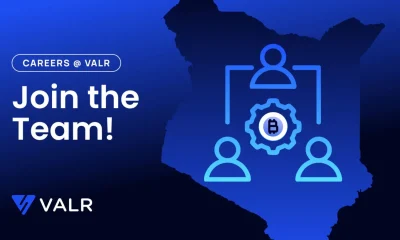Blockchain
Tokenization: Democratizing Ownership and Transforming Economies

The financial world is undergoing a significant transformation, fueled by the emergence of blockchain technology and its applications. One of the most disruptive and promising applications is the tokenization of real-world assets (RWAs). This innovative approach, where digital tokens represent ownership rights on a secure, distributed ledger, holds the potential to revolutionize how we own, trade, and manage a wide range of assets, from real estate and artwork to commodities and intellectual property. Imagine a world where a bustling marketplace allows you to invest in a fraction of a Picasso masterpiece, a luxurious beachfront property, or even a promising early-stage startup – all from the comfort of your mobile device.
[DOWNLOAD OUR MAGAZINE]
- DONJAZZY: MAKING MILLIONS WITH CRYPTO IN 10 MINUTES
- ALVIN RUME OPHI: INSIDE THE MIND OF A CRYPTO ANALYST
- JUDE OZINEGBE: INSPIRING NEXT GENERATION DIGITAL ECONOMY
Tokenization unlocks this future, enabling fractional ownership, streamlined transactions, and unprecedented global accessibility for a diverse range of assets. This write-up delves into the heart of this revolution, exploring the intricacies of tokenization, its transformative impact on RWAs, and the exciting possibilities that lie ahead. We’ll examine the potential benefits for investors, asset managers, and the broader financial ecosystem, while also acknowledging the challenges that need to be addressed to ensure the smooth and secure integration of tokenization into the mainstream. Join us as we unveil the future of asset ownership, a future powered by the transformative potential of blockchain technology and the ingenuity of tokenization.
Industry leaders like Blythe Masters, former CEO of Digital Asset Holdings, are optimistic about the potential of tokenization. She emphasizes the ability of tokenization to “unlock new sources of capital and liquidity
The Dawn of Tokenization: From Bits to Assets;- The term “tokenization” originates from the world of cryptocurrencies, where it initially referred to the creation of digital units of value stored on a blockchain. These tokens acted as a representation of ownership for a specific cryptocurrency project. However, the story of tokenization doesn’t end there. Just as the potential of the internet transcended email and online shopping, tokenization is blossoming beyond its crypto roots. This innovative concept is now being applied to a much vaster universe: real-world assets (RWAs). A 2022 report by Juniper Research estimates that the global market value for tokenized assets will reach $24 trillion by 2027, highlighting the anticipated growth in this sector.
Imagine a world where a physical asset, like a sprawling vineyard in Napa Valley or a priceless Van Gogh painting, can be transformed into a digital representation on a blockchain. This digital representation, known as a token, fragments the ownership of the real-world asset into smaller, more manageable units. Each token acts as a secure and verifiable unit of ownership, facilitating the buying, selling, and trading of these assets in a way that was previously unimaginable. This paves the way for a more inclusive and dynamic financial landscape, one where previously inaccessible assets become democratized and a wider range of investors can participate. As we delve deeper into the world of tokenization, we’ll explore the intricate details of this process, its transformative impact on RWAs, and the exciting possibilities it holds for the future of asset ownership and investment.
[READ OUR LATEST NEWS]
- South Africa eyes stablecoins and blockchain for digital payments
- Binance and Others in War with Nigeria Government
- PROOF OF STAKE AND ETHEREUM STAKING
- BLOCKCHAIN VS. ONLINE BANKING: A TALE OF TWO WORLDS
Unveiling the Essence of Tokenization: Fractionalization and Liquidity
At its core, tokenization represents a paradigm shift in the way we own and manage assets. It involves the process of converting a physical or intangible asset into a digital representation, known as a security token or asset token, stored on a secure and distributed ledger technology called a blockchain. These tokens essentially act as digital certificates of ownership, each representing a fractional share of the underlying asset.
One of the most transformative aspects of tokenization lies in its ability to democratize asset ownership. Industry leaders like Blythe Masters, former CEO of Digital Asset Holdings, are optimistic about the potential of tokenization. She emphasizes the ability of tokenization to “unlock new sources of capital and liquidity” for asset owners. Traditionally, ownership of high-value assets like real estate, fine art, or private equity was often restricted to a select group of wealthy individuals or institutional investors due to their significant price points. Tokenization, however, dismantles this barrier by fractionalizing these assets into smaller, more affordable units. This allows a broader range of investors, regardless of their financial standing, to participate in the ownership of previously inaccessible assets.
Furthermore, tokenization unlocks the potential for increased liquidity in the market for traditionally illiquid assets. Assets like real estate or private equity often face challenges in terms of trading efficiency. Their inherent illiquidity can make it difficult to find buyers quickly, leading to lengthy and cumbersome transactions. Tokenization tackles this issue by enabling these assets to be traded on secondary markets built on blockchain technology. These markets facilitate faster and more efficient transactions, potentially unlocking significant value for asset owners who can now exit their investments with greater ease.
The benefits of tokenization extend beyond democratization and increased liquidity. Here are some additional advantages:
- Enhanced Transparency and Security: Blockchain technology underpins tokenization, providing a tamper-proof record of ownership and transaction history. This transparency fosters trust and security within the investment landscape.
- Reduced Operational Costs: Tokenization streamlines the administrative processes associated with asset ownership and transfer. Smart contracts, self-executing programs on the blockchain, can automate tasks like dividend distribution and voting rights, leading to reduced operational costs for asset managers and custodians.
- Global Investment Opportunities: Tokenization removes geographical barriers, allowing investors worldwide to participate in previously inaccessible asset classes. This opens up new avenues for investment diversification and portfolio growth. PwC’s Global Blockchain Survey 2023 found that 60% of respondents believe tokenization will have a significant impact on the global economy within the next five years.
Real-World Assets Take Center Stage: A Spectrum of Possibilities
The transformative potential of tokenization extends far beyond a simple list of asset classes; it represents a paradigm shift in how we perceive and interact with ownership itself. Here’s an exploration of how tokenization is poised to reshape various real-world assets:
- Real Estate: Traditionally, investing in real estate often meant committing large sums of capital to acquire entire properties, limiting participation to high-net-worth individuals and institutional investors. Tokenization unlocks the possibility of fractional ownership, allowing individuals to invest in a portion of a luxury property in Manhattan, a commercial building in London, or even a portfolio of properties diversified across different geographical locations. This democratizes real estate investment, making it accessible to a broader range of individuals, regardless of their initial capital investment.
- Art and Collectibles: The art world, known for its exclusivity and high entry barriers, can be transformed through tokenization. Owning a fraction of a Picasso masterpiece, a rare antique from a renowned collection, or even a limited-edition sneaker becomes a possibility. This opens doors for passionate individuals and savvy investors to participate in the art and collectibles market, fostering greater liquidity and potentially unlocking significant value for asset owners.
- Commodities: The traditional trading of commodities like gold, oil, or agricultural products can be significantly streamlined through tokenization. By creating digital representations of these assets on a blockchain, tokenization facilitates faster, more transparent, and more efficient trading. This benefits various stakeholders, including producers, traders, and investors, by reducing transaction costs, increasing market accessibility, and mitigating potential fraud risks associated with traditional commodity trading practices.
- Intellectual Property: Intellectual property (IP), encompassing patents, copyrights, and trademarks, often represents a significant asset for businesses and individuals. However, monetizing IP can be challenging due to complex licensing agreements and administrative hurdles. Tokenization offers a novel solution by enabling the fractional ownership and easier licensing of intellectual assets. This allows rights holders to unlock the value of their IP by attracting a wider pool of potential investors and facilitating simpler royalty distribution mechanisms.
Furthermore, the potential applications of tokenization extend beyond these core examples. Imagine a future where:
- Startup funding: Early-stage businesses can raise capital by issuing tokenized securities, offering investors a more accessible and transparent investment opportunity.
- Supply chain management: Tokenization can be integrated into supply chain processes to track the movement of goods and ensure provenance, enhancing transparency and reducing counterfeiting risks.
- Voting rights: Tokenized ownership can be linked to voting rights, allowing for more efficient and secure voting mechanisms in various contexts, from corporate governance to community decision-making.
It’s important to acknowledge that the implementation of tokenization across these diverse use cases will require careful consideration of regulatory frameworks, technological advancements, and ongoing efforts to address potential security concerns. However, the potential benefits of democratization, increased liquidity, enhanced transparency, and streamlined processes make tokenization a powerful tool with the potential to reshape the very foundation of ownership and investment in the years to come.
CLICK HERE TO READ ABOUT OUR UPDATES ON EAST AFRICA
Beyond the Hype: Challenges and Considerations
However, it is important to acknowledge that tokenization is still an evolving technology, and certain challenges need to be addressed to ensure its smooth and secure integration into the mainstream financial landscape. These challenges include navigating the complexities of regulatory frameworks, addressing potential cybersecurity concerns, and ensuring the scalability and interoperability of blockchain platforms to handle the demands of a large-scale tokenized asset market.
While the potential of tokenization is undeniable, the road ahead is not without its challenges. Several key issues demand attention to ensure the responsible and successful integration of tokenized assets into the mainstream financial landscape:
- Regulatory Uncertainty: The legal landscape surrounding tokenized assets remains in flux. Regulatory frameworks are still evolving to adapt to this innovative technology, leading to uncertainty for potential issuers, investors, and market participants. This uncertainty can hinder the growth and adoption of tokenization, as stakeholders navigate complex and often ambiguous regulatory environments.
- Valuation Standards: Establishing clear and consistent valuation standards for tokenized assets is crucial for ensuring market transparency and investor protection. Traditional valuation methods may not be readily applicable to all tokenized assets, necessitating the development of new frameworks that consider the unique characteristics of this asset class. Inconsistency in valuation methodologies can create confusion and potential risks for investors, hindering market confidence and participation.
- Technology Infrastructure: The scalability and security of underlying blockchain infrastructure are critical considerations for the successful deployment of tokenized assets. As the adoption of tokenization grows, blockchain platforms need to be robust enough to handle the potential volume of transactions and ensure the secure storage and management of tokenized assets. Any vulnerabilities or limitations in the underlying technology could impact the security and efficiency of the entire ecosystem.Despite the existing challenges, the future of tokenization in real-world assets appears bright. As regulatory frameworks become clearer, technological infrastructure advances, and security concerns are mitigated, tokenization has the potential to revolutionize the way we invest, own, and trade assets, ultimately leading to a more inclusive, efficient, and transparent financial ecosystem.
Embracing the Future: Collaborative Efforts for Responsible Innovation
- Addressing these challenges requires a collaborative effort from various stakeholders:
- Regulators: Working to develop clear and adaptable regulations that encourage innovation while mitigating risks.
- Financial Institutions: Embracing tokenization and developing secure platforms for trading and managing tokenized assets.
- Technology Providers: Building scalable and secure blockchain infrastructure to support a thriving tokenized asset ecosystem.
Tokenization of real-world assets is not just a technological innovation; it’s a paradigm shift poised to reshape the way we interact with and manage assets. By addressing existing challenges and fostering collaboration, we can unlock the immense potential of this technology, promoting financial inclusion, increasing market efficiency, and ultimately, fueling economic growth.






































































